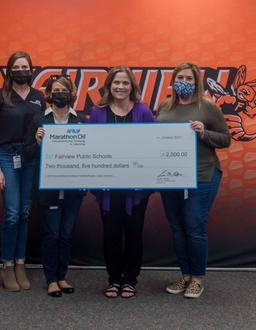Elaine Hutchison
As a 28-year teaching veteran of classes ranging from remedial Algebra 1 to AP Calculus, Elaine has helped many students with labeled “disabilities” to make a perfect score on the ACT and AP Calculus exams. In her ACT Prep class, students see on average a 3.8 point improvement in their ACT Composite score, with some students increasing their scores by as much as +12 points. In her math classes, she is committed to ensuring students enter college without having to take remedial algebra – and her three-year college remediation rate for mathematics is 20%, whereas the state average is significantly higher. In 2019, their average math ACT score was a 21.2, compared to the state average of 20.6. She has worked to encourage female students in STEM and English Language Learners to see math as a common language.
As a leader on her campus, when COVID-19 hit, Elaine was challenged by her district leadership to create professional learning to help teachers transition to virtual learning. She conducted “Teacher Tech Boot Camps” to help teachers throughout the district reach students through distanced learning. In the camps, she led teacher teams through brainstorming ways that they might be able to deliver content virtually and equitably and worked to overcome obstacles through solutions like free Wi-Fi parking lots and hotspot access to better facilitate remote learning.
In her own classes, students completed in cross-curricular projects over fractals in which they created presentations, developed a Google site and made TikTok videos about fractals. Even though her AP Calculus course was taught completely virtually, 100% of her students to passed their AP exams and received college credit.
“When the world was shutting down, I just went to work to find a way. I teach problem solving in math class every single day, and the pandemic has helped me model how to authentically approach problems and teach my students how to be solution driven.” – Elaine Hutchison, 9th – 12th Grade Mathematics Teacher
In 2019, Elaine won a grant to purchase two 3D printers for her classroom, which include specialized certification courses for herself and 10 students. She plans to use the Unconventional Thinking in Teaching grant to expand the current 3D printing program to allow for an “Extreme 3D STEAM” collaboration between her high school math students, a district third grade classroom and a local business owner. Students will be challenged to design and create original 3D printed cookie cutters for the owner of a main street baking company who had been inefficiently cutting individual pieces from 2D stencils for her artistic creations. Older students will mentor younger students and work collaboratively to brainstorm, design, create prototypes, refine their design and create a final product to present to the business owner.




















